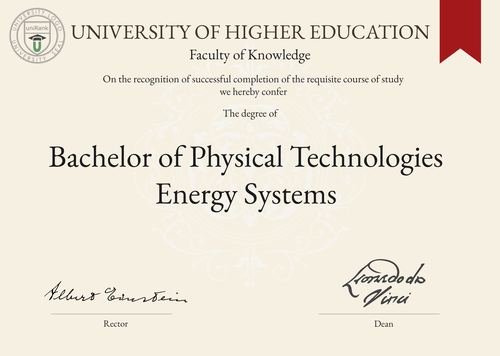
Bachelor of Physical Technologies Energy Systems (BPTES)
Guide to Bachelor of Physical Technologies Energy Systems Program/Course/Degree
Bachelor of Physical Technologies Energy Systems (BPTES)

Program Name:
Bachelor of Physical Technologies Energy SystemsProgram or Degree abbreviation:
BPTESDuration range:
The duration of the program typically ranges from 3 to 4 years.Tuition range:
The tuition fees for the program can vary depending on the chosen country or university. It is recommended to check with specific institutions for accurate information.Overview:
The Bachelor of Physical Technologies Energy Systems program is designed to provide students with a comprehensive understanding of energy systems and their applications. It combines theoretical knowledge with practical skills to prepare graduates for careers in the energy sector.Curriculum Overview by year:
- Year 1: Introduction to Energy Systems, Mathematics for Energy Systems, Physics Fundamentals, Introduction to Renewable Energy - Year 2: Energy Conversion Technologies, Energy Storage Systems, Thermodynamics, Energy Policy and Economics - Year 3: Power Generation Systems, Energy Efficiency and Management, Sustainable Energy Technologies, Energy Project Management - Year 4: Advanced Energy Systems, Energy Modeling and Simulation, Energy Policy Analysis, Capstone ProjectKey Components:
The key components of the program include studying energy systems, renewable energy technologies, energy conversion, energy storage, energy efficiency and energy policy. Students will also gain practical experience through laboratory work and industry internships.Career Prospects:
Graduates of the Bachelor of Physical Technologies Energy Systems program can pursue various career paths in the energy sector. They may find employment opportunities in renewable energy companies, energy consulting firms, government agencies, research institutions and utility companies.Salary Expectations:
The salary expectations for graduates of this program can vary depending on factors such as the chosen country, industry demand and individual qualifications. It is advisable to research specific job markets for accurate salary information. For a more accurate understanding of salary expectations, you can utilize the Job Sites Search Engine, from our sister site jobRank, which searches over 4,600 job sites worldwide. Make sure to specify not only the job title but also the country you are interested in.Conclusions:
It is important to note that the duration, tuition fees, curriculum, key components, career prospects and salary expectations of the Bachelor of Physical Technologies Energy Systems program can vary based on the chosen country or location for studying, as well as the chosen university. Prospective students are encouraged to explore different options and consider their individual preferences and goals. Visitors can search for institutions offering this specific degree worldwide through the uniRank World Universities Search Engine.World Universities Search Engine
search for Bachelor of Physical Technologies Energy Systems (BPTES) and add the Location (country, state etc.) or specific University you are interested in studying at.
Query examples:
- Bachelor of Physical Technologies Energy Systems (BPTES) United States
- Bachelor of Physical Technologies Energy Systems (BPTES) United Kingdom online
- Bachelor of Physical Technologies Energy Systems (BPTES) Australia international students
- Bachelor of Physical Technologies Energy Systems (BPTES) University of California
- Bachelor of Physical Technologies Energy Systems (BPTES) University of London tuition fees
- Bachelor of Physical Technologies Energy Systems (BPTES) University of Sydney scholarships
Share Program/Course
Interesting? Share this program/course/degree info with your friends now.